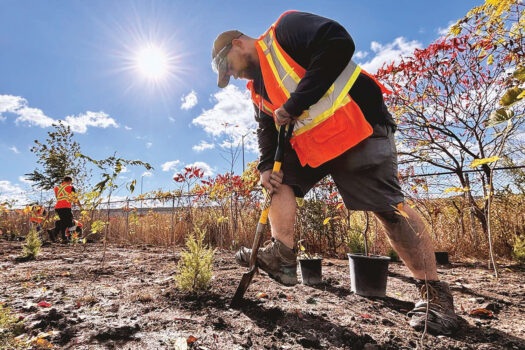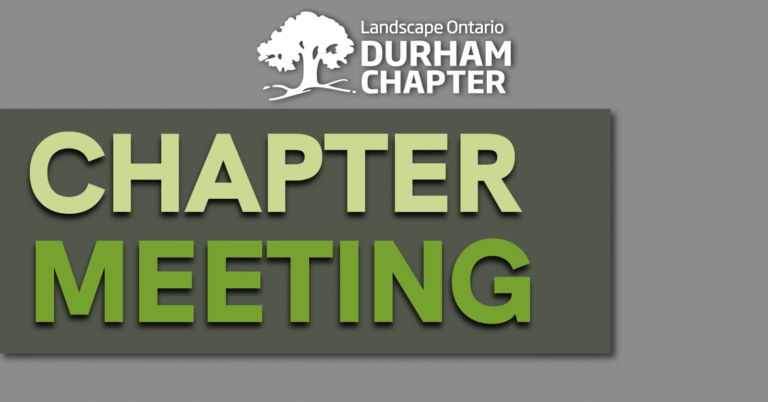By Terry Murphy CLM
 There are several violations under the Technical Standards and Safety Authority (TSSA), or the Ministry of Labour (MOL), which will result in your firm receiving a fine or penalty. Here are some items that some members have mentioned during the last couple of months that could save you from such a fine.
There are several violations under the Technical Standards and Safety Authority (TSSA), or the Ministry of Labour (MOL), which will result in your firm receiving a fine or penalty. Here are some items that some members have mentioned during the last couple of months that could save you from such a fine.
As you should know, the tolerance zone is one metre on either side of the locate line of a utility. Best practice says, that within the tolerance zone, one cannot use any machinery, but only hand tools. The question was asked if a mattock (a pick) can be used to loosen the soil for hand digging. Is it considered a hand tool? The answer is no.
Blunt edge
Ontario One Call has explained this to one of our members. “You may only use a hand tool that has a blunt edge (shovel) and nothing sharp or pointed. This may save you from puncturing a gas line if digging within the tolerance zone.” By the way, there is nothing in the Ontario Regional Common Ground Alliance (ORCGA) Best Practices manual that defines hand tools.
Can an excavating contractor use a copy of another contractor’s locate paperwork and proceed to excavate on the same job? TSSA has advised me that they will accept a copy of the locate paperwork, as long as it has not expired and the excavator has the copy on site and in the possession of the excavating operator.
Opposing opinions
Some of our contractors have been challenged by the MOL that each contractor digging at a location must call Ontario One Call for separate locates and have the locate paperwork on site. Now we seem to have two provincial safety organizations with opposing opinions. The Act does not mention anything about locate paperwork and only indicates that markings are necessary on the ground to show the excavator where the utility lines are located, so they can avoid damage. In my opinion, the safe thing to do is to call for your own locates and have your own paperwork.
Remember, TSSA is responsible for fuels and the underground damage prevention, so its practices should be accepted. Calling for locates is a free service, so it makes good sense to call ahead.
The other important point on locate paperwork is to be conscious of the expiry date and make sure the locate paperwork is valid, current and in the excavator’s possession and not filed at the office.

Get dialogue going
Landscape Ontario has Chapters in many of the same areas as the Ontario Regional Common Ground Alliance has councils. I would suggest that each Chapter has a representative go to each other’s meetings and get some dialogue going on common opportunities in each area. We have an open invitation from the ORCGA to attend sessions. The contact person at the ORCGA is Jennifer Parent at Jennifer@orcga.com, or telephone 1-905 328-7063.
At these meetings, you can learn about new laws, existing problems, and obtain suggestions on improving damage prevention in your market area. Also, please note that if you are experiencing any problems on the locate process, or obtaining timely locates, you may contact Steve Waugh at Ontario One Call. His job is to support the legislation for having timely locates completed in five business days and he wants to hear about any delays.
Backyards not marked
The locate markings that are provided by Ontario One Call will only be from the street or boulevard to where the utility enters the building and nothing beyond. Any services beyond this point, particularly those extending into residential backyards, are not marked by the locate company. These side lot or backyard utility underground services may have been installed after the building was finished and often neglected by contractors doing new renovations or upgrades. This could include electrical utilities to a pool or garage, natural gas to a backyard barbecue, or services to a pool change house, etc.
These utilities fall in the private locate area and the home owner or excavator has the responsibility to note the location of these before digging takes place. The services of a private locate company would be required and it is not covered by Ontario One Call. These backyard services are often neglected during construction. We have seen some critical injuries in recent years because of this neglect.
Call early
If you have an important project, or have a number of jobs that you can schedule far ahead, let your local locate company know so they can provide timely service to meet your schedule. I have found that the companies that provide locate services are very happy to work with you and are very accommodating, if they know your requirements in advance. This is particularly important in the spring start up period.
If you experience any project or item where there is an example of some practice, law or learning experience that we can pass on to your fellow contractors, please let me know and I will be happy to share it with the industry in this column.
Terry Murphy can be reached at tvmurphy@ca.inter.net.








